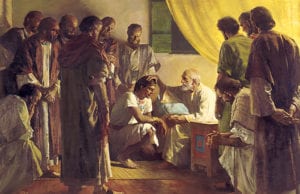
An Old Testament KnoWhy for Gospel Doctrine Lesson 12: “Fruitful in the Land of My Affliction” (Genesis 40-45) (JBOTL012A)
Question: Some of the most significant prophecies in scripture regarding the posterity of Jacob are found in the blessings of Judah and Joseph in Genesis 49. However much of the poetry in the blessings is difficult to understand. How should we understand the rich symbolism of these verses?
Summary: The Hebrew manuscripts of Jacob’s blessings of Judah and Joseph present difficult problems in translation, since they contain several obscure and archaic terms and phrases. Some important passages (e.g., “until Shiloh comes” [49:10]; “Joseph is a fruitful branch” [49:22]) have been particularly troublesome, leaving translators with few options outside of “conjectural emendation” to reconstruct the text. This approach may result in translations of key phrases that differ significantly from what is contained in the LDS edition of the Bible. Adding to the difficulties of interpretation of these blessings is that we have no direct help from modern scripture. Surprisingly, while Joseph Smith made substantive changes in the wording of the blessings of Ephraim and Manasseh in Genesis 48 and in the testament of Joseph in chapter 50, he made no significant changes to Genesis 49. And, apart from brief restatements of a few lines from Jacob’s words to Joseph in an 1833 blessing of Joseph Smith’s father, we have no other known allusions to the specific content of Genesis 49 in the teachings and history of the Prophet. The intent of this article is to make this chapter — arguably “the most difficult segment of the Book of Genesis” — more understandable for LDS readers. More importantly, it is hoped that this understanding will lead us to a greater dedication to our own responsibilities as the posterity of Israel.
The full article may be found at the Interpreter Foundation website: KnoWhy OTL12A — How Should We Understand the Rich Symbolism in Jacob’s Blessings of Judah and Joseph?

Some clarification can be found in 1 Chronicles 5: 2, where the birthright is passed on to Joseph’s son, Ephraim. What does the birthright entail? What rights and privileges does it accrue on the beneficiary?
Hi, Paul. Here’s what we are given in the LDS Bible Dictionary on “Birthright”:
Under the patriarchal order, the right or inheritance of the firstborn is known as birthright. This generally included a land inheritance as well as the authority to preside. The firstborn of flocks and of human families was considered as belonging to the Lord, and was expected to be dedicated to him. This dedication could be either literal or by the payment of redemption money (Ex. 13: 11-16). From time to time certain prerogatives, opportunities and blessings have attended those who were born of a particular lineage. Thus the office of high priest (of the Aaronic order) and the office of the patriarch to the Church (in the Melchizedek Priesthood) are hereditary in nature. Lineage alone does not guarantee the blessings or spiritual power of the office, but the opportunities are offered to the firstborn of the selected lineage. There are several instances in the scriptures of the one who was the firstborn losing his birthright because of unrighteousness, and his office being given to another; such is the case with Esau (Gen. 25: 24-34; Gen. 27), and Reuben (1 Chr. 5: 1-2; Jer. 31: 9).